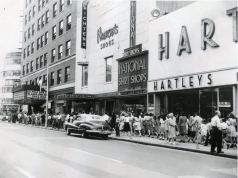During last week’s City of Miami District 2 candidate forum in Coconut Grove, incumbent Commissioner Ken Russell defended his legacy, asking the community to let him finish what he started.
“I’ve been fortunate to have passed probably more progressive legislation from this seat than any other elected in South Florida at any level,” Russell said. “My hope is that people still see that I am me. That I’m still fighting for the right reasons and that I believe in the votes that I am making.”
Russell, who was first elected in 2015, faced off with two challengers, real estate broker Jim Fried and real estate agent Javier Gonzalez, at the first candidate forum hosted by the Coconut Grove Village Council at Miami City Hall. A fourth candidate, Rosy Palomino, was not in attendance.
The candidates are vying to represent an area that includes the city’s priciest bayside properties, spanning areas from Coconut Grove to Morningside. The Grove is one of South Florida’s oldest settlements, making its preservation a key issue for members of the community.
Right from the start, during brief introductions, the challengers made their intentions clear. Fried critiqued the city’s lack of planning and bloated budget, as well as city officials’ pandering to insiders. Gonzalez directly attacked Russell, stating that the person in office “cannot be active as a partisan.” Both Fried and Gonzalez alluded to Russell’s ties to the Florida Democratic Party.
“I think it is fair game to target me because I am the only municipal elected official on the Florida Democratic board of trustees,” Russell said. “You can say it is Democrat or Republican, but for me, it is really about progressive values and making sure that legislative municipal seats state-wide are starting to work together and bring good ideas.”
Although the candidates had attended various similar events throughout the week, this was the first forum directly addressing Coconut Grove. The council’s secretary, Larissa Ozols, said questions were tweaked to avoid repetition from earlier debates.
“There are key issues that people want to know about,” Ozols said. “This is allowing people to see where [the candidates] stand on the important issues of Coconut Grove.”
The topic that garnered the most attention from the community was the Neighborhood Conservation District (NCD). According to city documents, the intent of the NCD is to “establish a protective series of legislative elements to preserve the historic, heavily landscaped character of Coconut Grove’s residential areas; enhance and protect Coconut Grove’s natural features such as the tree canopy and green space; and protect the architectural variety within the unique single-family neighborhood that comprises Coconut Grove.”
Russell said his biggest defeat so far has been failing to tighten the loopholes of the NCD. However, he does not call it a failure because the work is not done. He attributed the loss to the silent power of developers who have felt threatened by the restrictions that his office has wanted to set. He also blamed the other commissioners.
“You have very ideologue commissioners with philosophies that believe that property rights mean there shouldn’t be zoning rules,” Russell said. “I believe we could get there, but I do have to admit we have not gotten there yet. It has been a very tough battle.”
Gonzalez agreed that the NCD was Russell’s biggest defeat. He said the message was lost early on and that the role of the commissioner is to ensure the votes needed for legislation to pass. When asked about Russell’s positive traits, Gonzalez said “marketing,” acknowledged the incumbent’s ability to get people to come out and support initiatives and projects.
Gonzalez’s platform focused on maintaining and growing already established assets, such as Miami Forever, a “$400 million general obligation bond … will pay for projects to protect homes and property from sea-level rise flooding and increase affordable housing,” according to city documents. Gonzalez’s goal regarding the NCD, he said, is to address duplexes and to make the law more enforceable.
Throughout the night, Fried repeatedly brought up his own proposal regarding infrastructure and the NCD. His wants to create a ballot initiative that would designate different infrastructure districts, which he said would return direct control to the neighborhoods.
“This will give the local folks in the district total hands-on control of what is going on from an infrastructure basis,” Fried said. “If you did not like what was going on, you could simply stop it, and this would collapse all of the local and county people that are involved. You would have a direct shot at solving problems.”
In the closing statements, Russell said that Gonzalez was taking away votes from him, which would strengthen Fried’s chances. From a financial standpoint, it is seen as a two-man race between Russell and Fried. In the last month, Russell has raised $30,850. Fried was close behind, raising $29,248. Gonzalez garnered just $749.31.
Gonzalez did not appreciate Russell’s remarks.
“Everybody says I can’t win this race. By taking votes away, I am doing my job of presenting my positions,” Gonzalez said. “Instead of dividing let’s unite, let’s work towards our common goals … We just got to get things done. I feel I can get those things done.”
The District 2 election is scheduled for Nov. 5, 2019 as part of the general election.
































